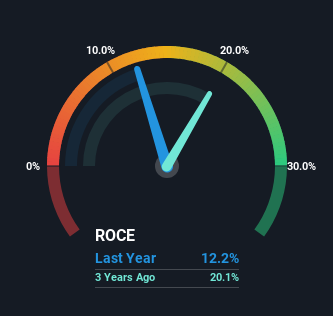- Hong Kong
- /
- Entertainment
- /
- SEHK:777
NetDragon Websoft Holdings (HKG:777) Will Be Hoping To Turn Its Returns On Capital Around

What financial metrics can indicate to us that a company is maturing or even in decline? Typically, we'll see the trend of both return on capital employed (ROCE) declining and this usually coincides with a decreasing amount of capital employed. This reveals that the company isn't compounding shareholder wealth because returns are falling and its net asset base is shrinking. Having said that, after a brief look, NetDragon Websoft Holdings (HKG:777) we aren't filled with optimism, but let's investigate further.
Return On Capital Employed (ROCE): What Is It?
For those who don't know, ROCE is a measure of a company's yearly pre-tax profit (its return), relative to the capital employed in the business. The formula for this calculation on NetDragon Websoft Holdings is:
Return on Capital Employed = Earnings Before Interest and Tax (EBIT) ÷ (Total Assets - Current Liabilities)
0.12 = CN¥791m ÷ (CN¥11b - CN¥4.1b) (Based on the trailing twelve months to June 2024).
Therefore, NetDragon Websoft Holdings has an ROCE of 12%. In absolute terms, that's a pretty normal return, and it's somewhat close to the Entertainment industry average of 11%.
Check out our latest analysis for NetDragon Websoft Holdings

In the above chart we have measured NetDragon Websoft Holdings' prior ROCE against its prior performance, but the future is arguably more important. If you're interested, you can view the analysts predictions in our free analyst report for NetDragon Websoft Holdings .
What The Trend Of ROCE Can Tell Us
There is reason to be cautious about NetDragon Websoft Holdings, given the returns are trending downwards. Unfortunately the returns on capital have diminished from the 15% that they were earning five years ago. And on the capital employed front, the business is utilizing roughly the same amount of capital as it was back then. Since returns are falling and the business has the same amount of assets employed, this can suggest it's a mature business that hasn't had much growth in the last five years. So because these trends aren't typically conducive to creating a multi-bagger, we wouldn't hold our breath on NetDragon Websoft Holdings becoming one if things continue as they have.
On a side note, NetDragon Websoft Holdings' current liabilities have increased over the last five years to 38% of total assets, effectively distorting the ROCE to some degree. If current liabilities hadn't increased as much as they did, the ROCE could actually be even lower. Keep an eye on this ratio, because the business could encounter some new risks if this metric gets too high.
The Key Takeaway
In the end, the trend of lower returns on the same amount of capital isn't typically an indication that we're looking at a growth stock. It should come as no surprise then that the stock has fallen 19% over the last five years, so it looks like investors are recognizing these changes. That being the case, unless the underlying trends revert to a more positive trajectory, we'd consider looking elsewhere.
If you want to continue researching NetDragon Websoft Holdings, you might be interested to know about the 2 warning signs that our analysis has discovered.
If you want to search for solid companies with great earnings, check out this free list of companies with good balance sheets and impressive returns on equity.
Valuation is complex, but we're here to simplify it.
Discover if NetDragon Websoft Holdings might be undervalued or overvalued with our detailed analysis, featuring fair value estimates, potential risks, dividends, insider trades, and its financial condition.
Access Free AnalysisHave feedback on this article? Concerned about the content? Get in touch with us directly. Alternatively, email editorial-team (at) simplywallst.com.
This article by Simply Wall St is general in nature. We provide commentary based on historical data and analyst forecasts only using an unbiased methodology and our articles are not intended to be financial advice. It does not constitute a recommendation to buy or sell any stock, and does not take account of your objectives, or your financial situation. We aim to bring you long-term focused analysis driven by fundamental data. Note that our analysis may not factor in the latest price-sensitive company announcements or qualitative material. Simply Wall St has no position in any stocks mentioned.
About SEHK:777
NetDragon Websoft Holdings
Provides online and mobile games the People’s Republic of China, the United States, the United Kingdom, and internationally.
Undervalued with excellent balance sheet and pays a dividend.
Similar Companies
Market Insights
Community Narratives



